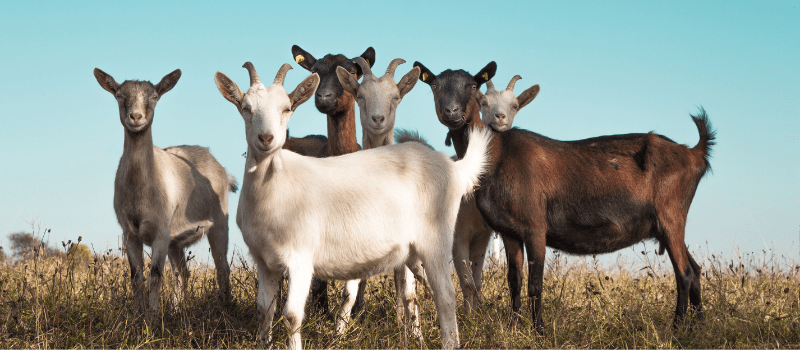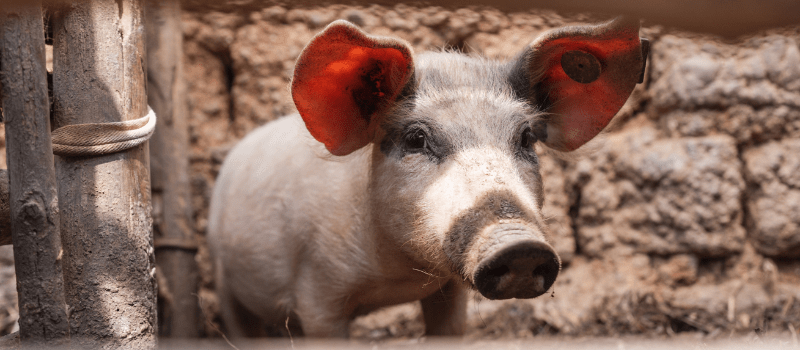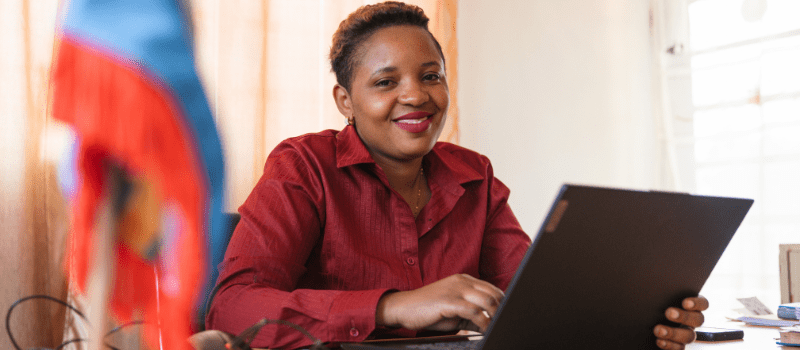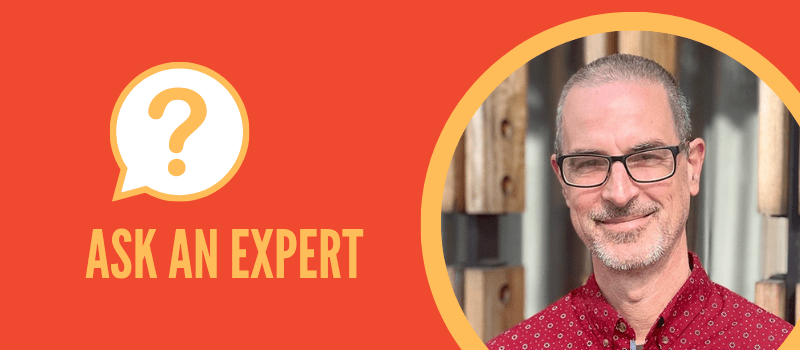This blog was written by Tanja Kisslinger, Director of Communications at VWB, following her 2023 field visit to Ghana, where she met the women Community Animal Health Workers (CAHWs) advancing gender equality, animal welfare, and sustainable livelihoods through the VETS program.
Meeting Ida in Upper East Ghana
I felt the heat before I saw Ida Achatowe’s smile.
The air in Kologo Village hung thick with dust and sunlight, the kind of dry heat that slows your breath. Goats bleated from wooden pens, chickens darted through the red earth, and the soft hum of daily work filled the air. Amid it all stood Ida — bright yellow VETS program t-shirt, patterned headwrap, and an easy, shy smile that hinted at quiet confidence.
She had finished her morning rounds but agreed to show me how she and fellow CAHW Clement Afuo spend their days — walking from compound to compound, checking animals, treating wounds, and talking with farmers about disease prevention.
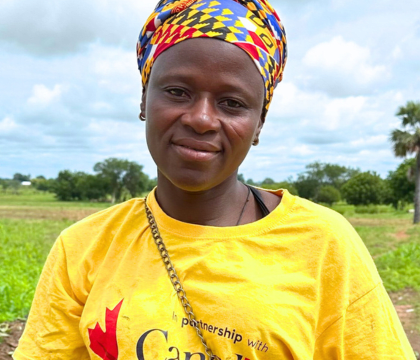 PHOTO: Ida Achatowe, CAHW.
PHOTO: Ida Achatowe, CAHW.
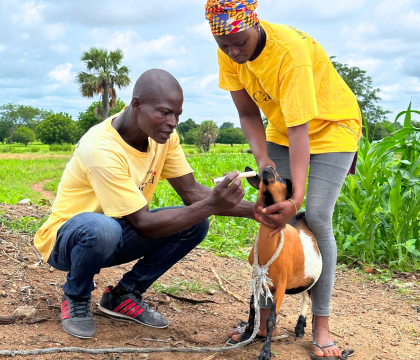 PHOTO: Ida and Clement deworm a young goat.
PHOTO: Ida and Clement deworm a young goat.
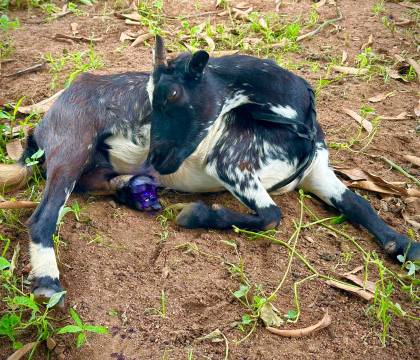 PHOTO: Goat rests after treatment for split hoof.
PHOTO: Goat rests after treatment for split hoof.
Where access is scarce, local leaders step up
In Ghana’s Upper East Region, home to 1.3 million people and over 3 million livestock, there are only six licensed veterinarians. Each is responsible for vast distances, supported by just a handful of Animal Health Officers. It’s here that VWB’s partner, the Ghana Poultry Network (GAPNET), has trained more than 90 Community Animal Health Workers (CAHWs) — 63 of them women — to extend care to the most remote farms.
Their presence has changed everything.
“There are many procedures that don’t require a veterinarian,” said Dr. Gilbert Asago, the region’s only vet serving four communities. “CAHWs like Ida and Clement can manage vaccinations, deworming, or wounds. They only call me when it’s truly needed. The more CAHWs we have, the healthier our animals and farms become.”
That partnership between professionals and trained community workers represents a quiet but powerful shift in how animal care — and trust — is built from within.
Technology meets tradition
On one farm, an elderly farmer named Ameliba approached Ida about a young goat suffering from persistent diarrhea. Without hesitation, Ida and Clement began their assessment, then pulled out their phones to open the FAO’s Event Mobile Application (EMA-i) — a real-time disease surveillance tool that connects frontline workers to Ghana’s national animal health authorities.
 PHOTO: In Kologo Community, CAHWs Clement (left) and Ida (center) use the FAO’s (EMA-i) to record and report a baby goat’s illness for farmer Ameliba (right).
PHOTO: In Kologo Community, CAHWs Clement (left) and Ida (center) use the FAO’s (EMA-i) to record and report a baby goat’s illness for farmer Ameliba (right).
“If we report something serious, like a disease outbreak, the response comes immediately,” Clement explained, showing the confirmation message on his screen.
It was remarkable: a national surveillance system operating from a sun-baked village path, powered by two local CAHWs and a mobile signal.
Margaret’s quiet leadership
The next day in Sirigu Community, I met Margaret Aligiya, one of the first women in the region to become a CAHW. She greeted me surrounded by goats, her record book in hand — calm, steady, purposeful.
“At first, women were not involved in animal health,” Margaret said. “But now we’re going around to the villages, helping with poultry and livestock, and the communities are very happy with us.”
That morning, Margaret and two fellow CAHWs vaccinated over 380 animals before the sun reached its peak. Farmers arrived one by one, leading goats and sheep by rope, waiting patiently for their turn. Between injections, Margaret recorded each farmer’s name, the number of animals, and the type of treatment — meticulous work that keeps the region’s disease data accurate.
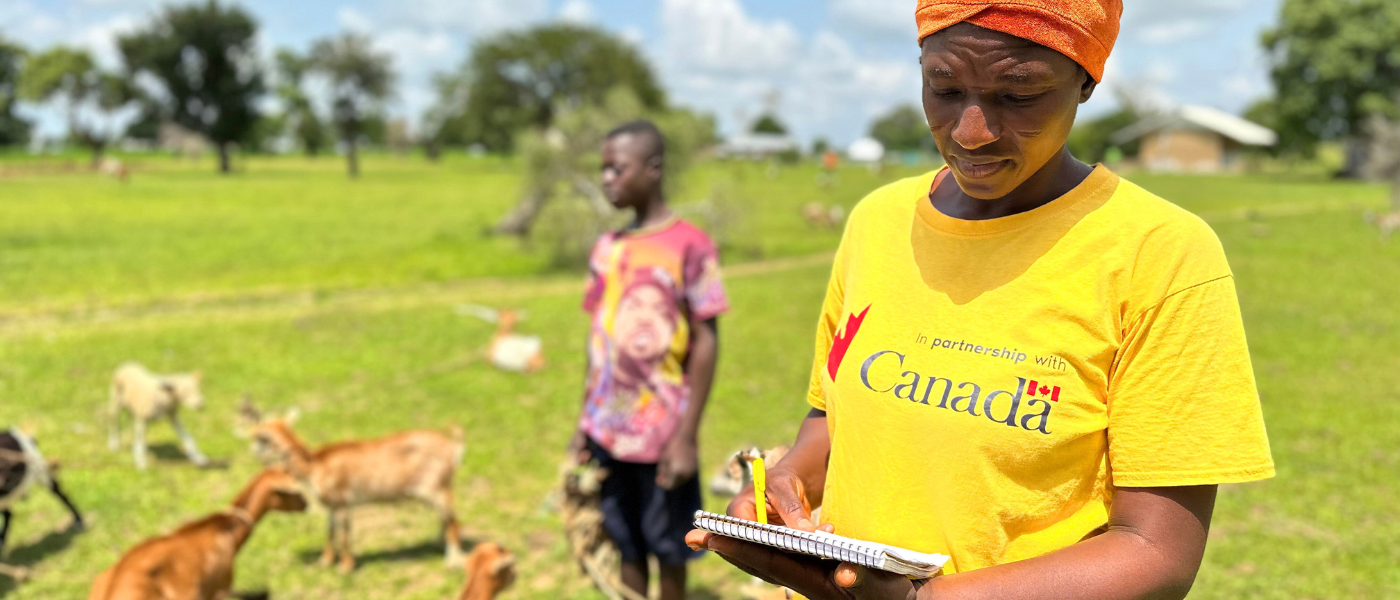 PHOTO: Margaret Aligiya, CAHW in Sirigu community, carefully records farmers and goats at a vaccination campaign.
PHOTO: Margaret Aligiya, CAHW in Sirigu community, carefully records farmers and goats at a vaccination campaign.
She told me her husband had once doubted her new role. “Now he relies on my help,” she smiled. “It brings respect — and a little income too.”
A few other CAHWs in the area, Maria and Ester, have begun earning small fees for their animal health services. Maria opened a roadside spice shop, while Ester started renting out chairs for community events. Modest ventures, perhaps — but for women in rural Ghana, they represent both independence and dignity.
Anna and the women of hope
In Kongwania Community, I was greeted by Anna Millicent Agamba, whose energy filled the air before she even spoke. A CAHW and leader of the Gegitina Women’s Association — meaning “we have hope” — Anna radiated the kind of joy that makes the world around her lighter.
“When we first said women would help care for animals, people laughed,” she said, gesturing toward her goats. “They said our duty was in the kitchen, not with livestock. But as we held meetings and invited men to join, they began to understand us. Now, when you go to the community and ask about women animal workers, they’ll tell you animal deaths have gone down.”
She led me through her compound, pointing proudly to her maize, mango, and cashew trees, grown with support from GAPNET after her training.
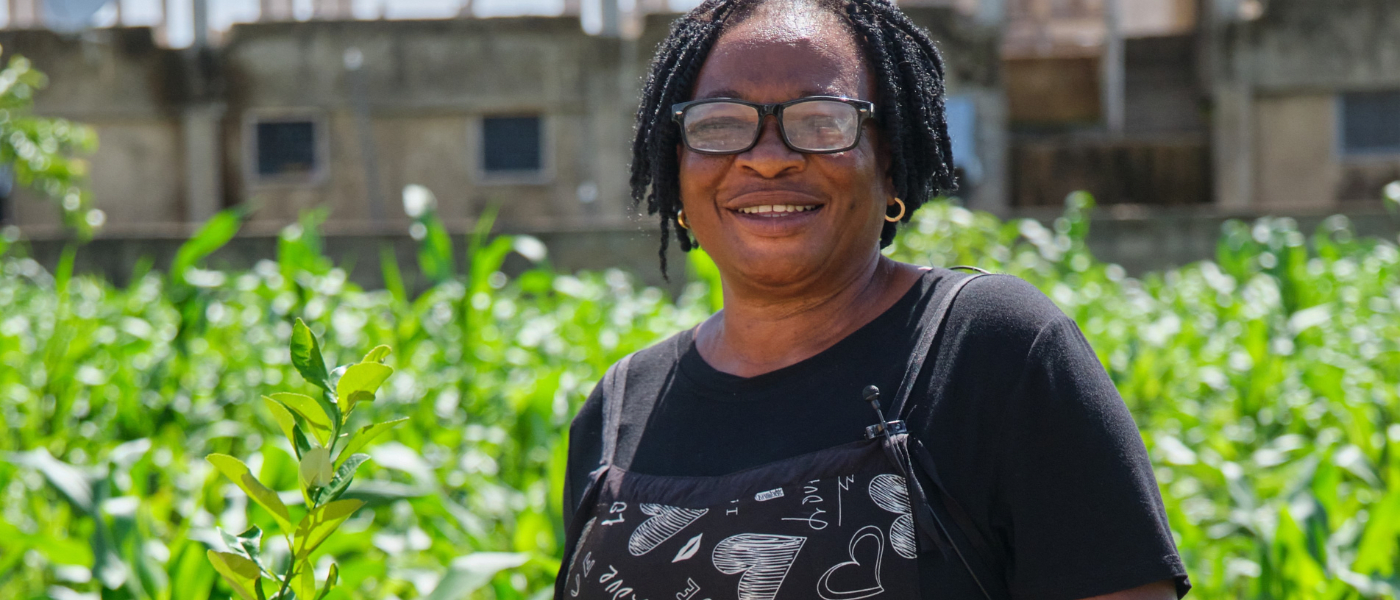 PHOTO: Anna Agamba, a CAHW from Kongwania, shares how VETS is empowering women to lead in animal health and strengthen their communities. Watch her story.
PHOTO: Anna Agamba, a CAHW from Kongwania, shares how VETS is empowering women to lead in animal health and strengthen their communities. Watch her story.
“The happiness I get when I come out to see my birds, my goats, and the trees growing — I’m always very happy,” she said, beaming. “The animals are healthier, women are learning, and some are starting small businesses. There is real change.”
Anna’s words captured the essence of VWB’s approach: when women are given knowledge and tools, entire communities flourish.
More than medicine
Across Bolgatanga, I saw how each woman’s story formed part of a larger whole — a movement built on trust, knowledge, and care.
In places where veterinary services are scarce, CAHWs are not just animal health providers. They are mentors, mediators, and models of resilience. Their work prevents disease outbreaks, sustains family livelihoods, and challenges generations of gender norms — showing what leadership looks like when it’s rooted in community.
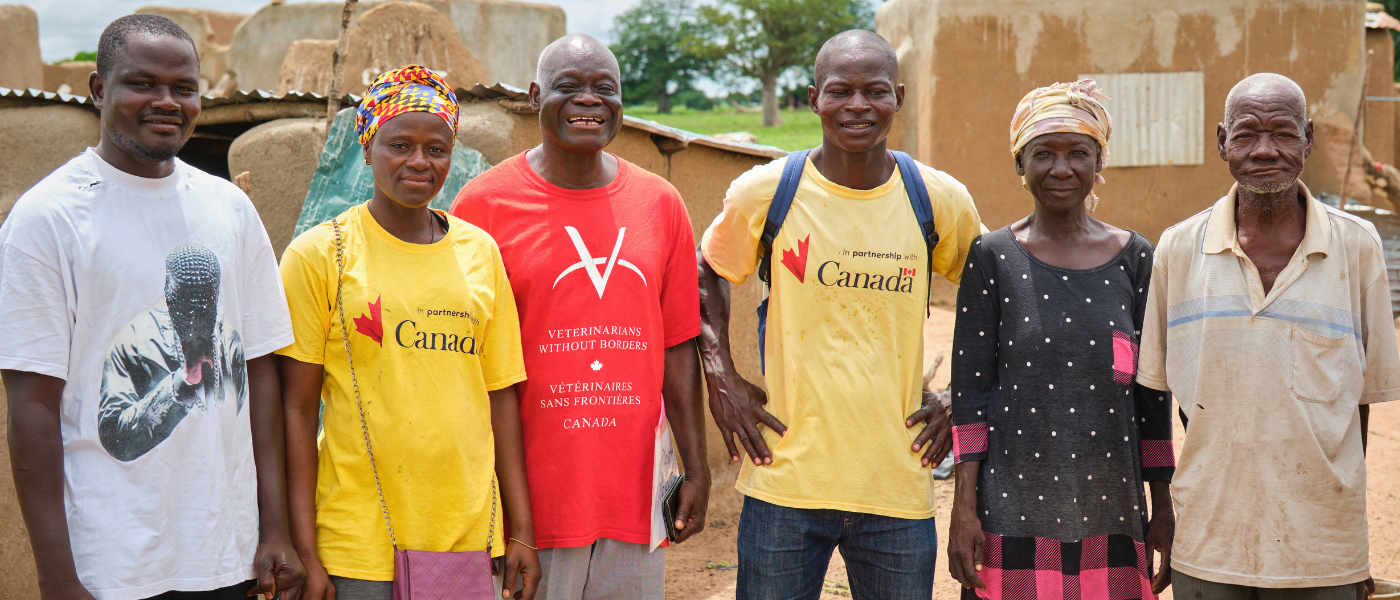 PHOTO: (L–R) Dr. Gilbert Asago, veterinarian for Kologo and surrounding communities; CAHW, Ida Achatowe; GAPNET Executive Director, Dr. Anthony Akunzule; CAHW Clement Afuo; and farmer Ameliba with her husband, Awini. Together, they represent the partnerships driving sustainable animal health in Ghana’s Upper East Region.
PHOTO: (L–R) Dr. Gilbert Asago, veterinarian for Kologo and surrounding communities; CAHW, Ida Achatowe; GAPNET Executive Director, Dr. Anthony Akunzule; CAHW Clement Afuo; and farmer Ameliba with her husband, Awini. Together, they represent the partnerships driving sustainable animal health in Ghana’s Upper East Region.
Why this matters
Programs like VETS (Volunteers Engaged in Gender-Responsive Technical Solutions), funded by Global Affairs Canada, are helping build this change across Africa and Asia — training local leaders, strengthening gender equality, and reducing vulnerability to zoonotic diseases.
This GivingTuesday, we’re celebrating these community heroes and the systems they sustain. Every $1 you give becomes $3 through our Triple Match campaign — helping train more CAHWs like Ida, Margaret, and Anna who bring veterinary care to where it’s needed most.
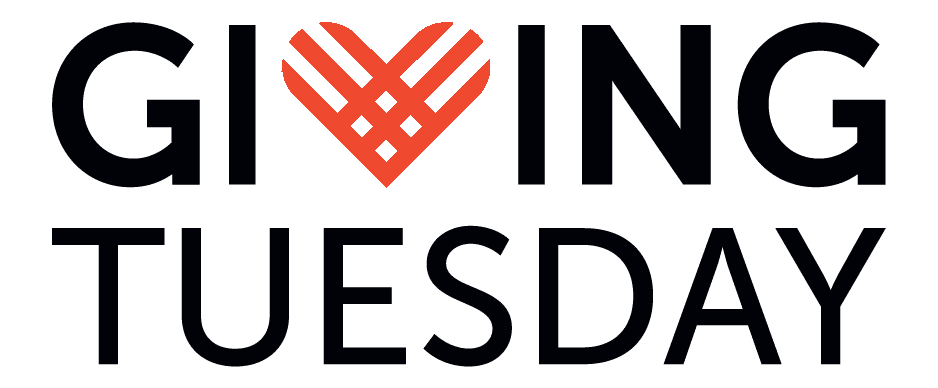
From local care to lasting change.
Your GivingTuesday gift strengthens VWB’s network of Community Animal Health Workers — empowering communities to prevent disease, protect livelihoods, and build resilience from the ground up.
Every gift is tripled until December 2nd, 2025.

